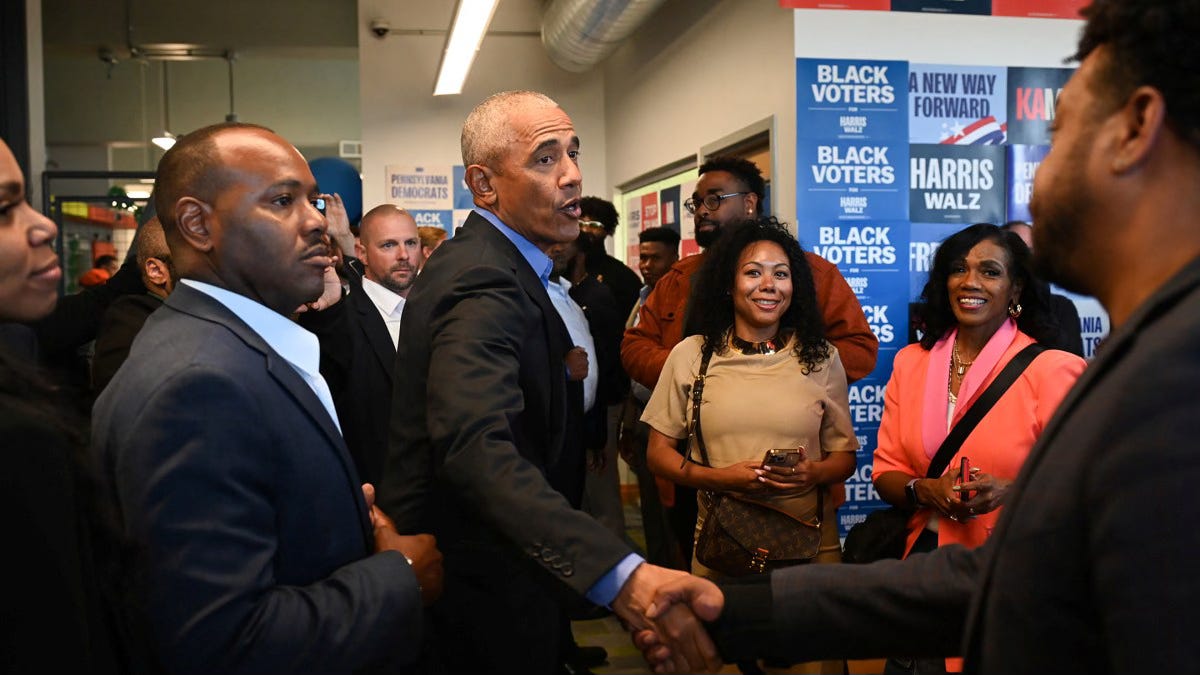Is there a racial realignment happening?
There is some shifting with Black voters, but it's a bit overhyped
I have a piece up at the Dispatch about the extent to which a realignment is occurring in this election cycle and, beyond that, just what realignment means in the long swathe of American history. I hope you’ll read it! But I want to dig into the data on just what we know about a specific story that’s getting a lot of attention lately: whether Black voters are abandoning the Democratic Party.
A recent New York Times / Siena College survey of 589 Black voters definitely offers some findings to concern Democrats. It shows 78 percent of Black voters planning to vote for Democrat Kamala Harris, whereas Joe Biden received 90 percent of their votes in 2020. Harris’ 78% is substantially better than where Biden was polling a few months ago, but would also represent a significant erosion in the Black Democratic vote and could spell her loss in competitive states with substantial Black populations. What’s more, unlike some other surveys, this one doesn’t show any real distinction by age or education levels (although a substantial gender gap). Other surveys have suggested that it was mainly younger Blacks and those without a college education drifting toward the Republican Party; that doesn’t seem to be happening here.
Okay, so what can we make of this? One thing that I’d note is that the table below is setting up a poor comparison: It compares polling now with the vote outcomes in 2016 and 2020, not with polling a month prior to those elections.
Why does this matter? Well, if we look at some polls from the fall of 2020, we see that Biden was expected to get around 83 or 84 percent of the Black vote in that election. This substantially understates the vote share he would actually receive. This means that Harris is about five points (not 22) behind where Biden was four years ago among Black voters. That still matters, but it’s a very different story. (For what it’s worth, a recent Pew survey shows Harris winning 84% of the Black vote, basically the same that Biden was expected to win that demographic by in 2020.)
What explains the difference between polling numbers and election results? Black voters have a history of understating their support for the Democratic ticket in surveys, and undecided Black voters tend to close strongly for the Democratic ticket. That doesn’t mean that’s what’s going to happen this year, of course, but it’s useful context.
Trump received 12% of the Black vote in 2020. While this figure is not large, it’s the best performance by a Republican presidential candidate among Black voters in the 21st century, and was last exceeded by Gerald Ford in 1976. If Trump wins the 15 or so percent of the Black vote expected by the NYT/Siena poll, that may or may not be enough to win the overall contest, but it would still represent a historic shift in the Republican direction.
I’ve mentioned this before, but Chryl Laird and Ismail White’s excellent book Steadfast Democrats has some value for explaining this current moment. What Laird and White note is that there are large numbers of Black voters who identify as conservatives and endorse a broad range of conservative stances on economics and other issues, but nonetheless vote reliably Democratic due to longstanding traditions and social pressures. That could be changing. Substantial shifts in a group’s voting behavior have happened before, and Black Americans were once a reliably Republican voting bloc. But it took something quite major to change that previously.
I still have a hard time grasping that this is the moment in which Black voters start to leave the Democratic coalition, or that Donald Trump is the guy they’ll do that for. But again, there’s no reason it has to stay the way it’s been.







